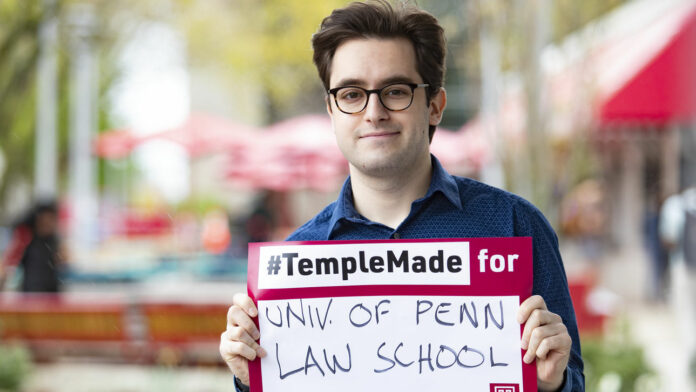As Gianni Quattrocchi prepares to graduate from Temple University this week, he wants to instill one piece of advice on incoming freshmen: be open to change.
When this Bristol Borough native began his collegiate journey in 2020, he was majoring in mechanical engineering. However, during his first semester, he realized that he didn’t feel particularly passionate about the field. Rather than stick with his initial plan and doom himself to an unhappy future, he allowed himself to switch gears and recognize his true interest: politics.
Now, with a BA in political science from Temple’s College of Liberal Arts and plans to attend the University of Pennsylvania Law School in the fall, Quattrocchi envisions an eventual career in the political realm, where he hopes to make positive change and bring back the “human” element of government.
During his years at Temple, Quattrocchi didn’t just study politics — he experienced them firsthand. As a junior, he held the position of Temple Student Government president at a rather chaotic time. There was the month-long union strike of graduate student workers, mounting campus safety concerns, a new Temple president and the loss of a police officer.
“It was eventful,” said Quattrocchi. “Some might call it chaotic, but there was a lot of opportunity for engagement and involvement at a level that TSG had not been involved in for a long time. I felt we were the most active and effective student government last year (2022-23). I would put us in the top 10 last year. There was a high level of opportunity, especially around public safety.”
Quattrocchi’s tenure saw him collaborating with university administrators and public safety officials to host open-mic town halls, where students could have their voices heard, and spreading awareness about campus safety resources that were already in place, but not widely known about. These include a walking escort that allows students to have a police officer or campus security guard walk them to their destination, and an app that informs police and friends/family when a student arrives at their location safely.
In fact, Quattrocchi’s efforts earned him media coverage on both national and local television, and on digital platforms such as The Philadelphia Inquirer and Inside Higher Education.
As president, Quattrocchi learned the tricky art of balancing student requests with their best interests, which would sometimes conflict with each other.
“It was a lot of hearing the different needs and demands of stakeholders in the university and, based on the information you have, making the determination of what the best path and policy was,” he said.
Additionally, Quattrocchi completed several internships with elected officials: U.S. Sen. Bob Casey, state Rep. Tina Davis and state Sen. Steve Santarsiero. While working at their regional offices, Quattrocchi gained a firsthand look into how politics actually operate.
“There’s things you learn in the classroom, and then there’s the things you can only really learn through experience,” he said.
For example, he learned that, despite a piece of legislation appearing to be bipartisan, many constituents would call in to express genuine concerns about it, leading lawmakers to reevaluate it and craft a more robust bill.
Such internships, as well as his time as TSG president, got Quattrocchi thinking about what he would like to see improved upon if he were to ever take office. One order of business would be pushing for free lunches in schools, from elementary to high school, regardless of a student’s financial status.
“It’s obviously expensive, but at the same time, if children aren’t hungry, they have more opportunities to focus on their schoolwork, to get a better education,” he said. “Providing a service such as that would have enormous benefits for a student’s education and it would open a lot more doors for them in the long run. Again, it’s expensive, but when compared to the long-term outcomes and benefits, it’s pretty cheap in that regard.”
A second order of business would be to bring back the “human” element of politics, a concept introduced to him by assistant political science professor Lauren Farmer, whom he credits with the framework for his career, during her international relations classes.
“People sometimes get reduced to numbers, but we are here to help people,” said Quattrocchi. He added, “That class, it changed my perspective in terms of that because it really was the root of politics in my view, which is, we’re here to serve others. We’re here to help uplift our communities. It’s not a numbers game. Pretty much every essay in her classes had an element of, ‘Why should we care?’ It’s usually not a discussion that we have in politics, but it’s a discussion that we need to have more often, in my view.”
It might be a bittersweet feeling for Quattrocchi to don his cap and gown and say “goodbye” to the home of the Owls, but he feels equipped with the skills and knowledge needed to move forward into this next chapter and beyond.
Samantha Bambino can be reached at [email protected]


